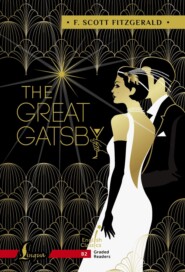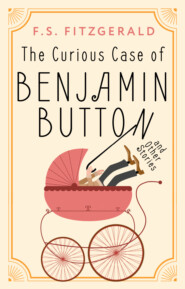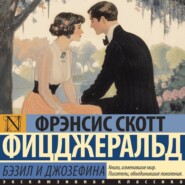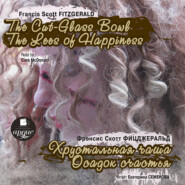По всем вопросам обращайтесь на: info@litportal.ru
(©) 2003-2025.
✖
The Beautiful and Damned
Настройки чтения
Размер шрифта
Высота строк
Поля
Then the illusion snapped like a nest of threads; the room grouped itself around him, voices, faces, movement; the garish shimmer of the lights overhead became real, became portentous; breath began, the slow respiration that she and he took in time with this docile hundred, the rise and fall of bosoms, the eternal meaningless play and interplay and tossing and reiterating of word and phrase – all these wrenched his senses open to the suffocating pressure of life – and then her voice came at him, cool as the suspended dream he had left behind.
"I belong here," she murmured, "I'm like these people."
For an instant this seemed a sardonic and unnecessary paradox hurled at him across the impassable distances she created about herself. Her entrancement had increased – her eyes rested upon a Semitic violinist who swayed his shoulders to the rhythm of the year's mellowest fox-trot:
"Something – goes
Ring-a-ting-a-ling-a-ling
Right in-your ear – "
Again she spoke, from the centre of this pervasive illusion of her own. It amazed him. It was like blasphemy from the mouth of a child.
"I'm like they are – like Japanese lanterns and crape paper, and the music of that orchestra."
"You're a young idiot!" he insisted wildly. She shook her blond head.
"No, I'm not. I am like them… You ought to see… You don't know me." She hesitated and her eyes came back to him, rested abruptly on his, as though surprised at the last to see him there. "I've got a streak of what you'd call cheapness. I don't know where I get it but it's – oh, things like this and bright colors and gaudy vulgarity. I seem to belong here. These people could appreciate me and take me for granted, and these men would fall in love with me and admire me, whereas the clever men I meet would just analyze me and tell me I'm this because of this or that because of that."
– Anthony for the moment wanted fiercely to paint her, to set her down now, as she was, as, as with each relentless second she could never be again.
"What were you thinking?" she asked.
"Just that I'm not a realist," he said, and then: "No, only the romanticist preserves the things worth preserving."
Out of the deep sophistication of Anthony an understanding formed, nothing atavistic or obscure, indeed scarcely physical at all, an understanding remembered from the romancings of many generations of minds that as she talked and caught his eyes and turned her lovely head, she moved him as he had never been moved before. The sheath that held her soul had assumed significance – that was all. She was a sun, radiant, growing, gathering light and storing it – then after an eternity pouring it forth in a glance, the fragment of a sentence, to that part of him that cherished all beauty and all illusion.
CHAPTER III
THE CONNOISSEUR OF KISSES
From his undergraduate days as editor of The Harvard Crimson Richard Caramel had desired to write. But as a senior he had picked up the glorified illusion that certain men were set aside for "service" and, going into the world, were to accomplish a vague yearnful something which would react either in eternal reward or, at the least, in the personal satisfaction of having striven for the greatest good of the greatest number.
This spirit has long rocked the colleges in America. It begins, as a rule, during the immaturities and facile impressions of freshman year – sometimes back in preparatory school. Prosperous apostles known for their emotional acting go the rounds of the universities and, by frightening the amiable sheep and dulling the quickening of interest and intellectual curiosity which is the purpose of all education, distil a mysterious conviction of sin, harking back to childhood crimes and to the ever-present menace of "women." To these lectures go the wicked youths to cheer and joke and the timid to swallow the tasty pills, which would be harmless if administered to farmers' wives and pious drug-clerks but are rather dangerous medicine for these "future leaders of men."
This octopus was strong enough to wind a sinuous tentacle about Richard Caramel. The year after his graduation it called him into the slums of New York to muck about with bewildered Italians as secretary to an "Alien Young Men's Rescue Association." He labored at it over a year before the monotony began to weary him. The aliens kept coming inexhaustibly – Italians, Poles, Scandinavians, Czechs, Armenians – with the same wrongs, the same exceptionally ugly faces and very much the same smells, though he fancied that these grew more profuse and diverse as the months passed. His eventual conclusions about the expediency of service were vague, but concerning his own relation to it they were abrupt and decisive. Any amiable young man, his head ringing with the latest crusade, could accomplish as much as he could with the débris of Europe – and it was time for him to write.
He had been living in a down-town Y.M.C.A., but when he quit the task of making sow-ear purses out of sows' ears, he moved up-town and went to work immediately as a reporter for The Sun. He kept at this for a year, doing desultory writing on the side, with little success, and then one day an infelicitous incident peremptorily closed his newspaper career. On a February afternoon he was assigned to report a parade of Squadron A. Snow threatening, he went to sleep instead before a hot fire, and when he woke up did a smooth column about the muffled beats of the horses' hoofs in the snow… This he handed in. Next morning a marked copy of the paper was sent down to the City Editor with a scrawled note: "Fire the man who wrote this." It seemed that Squadron A had also seen the snow threatening – had postponed the parade until another day.
A week later he had begun "The Demon Lover."…
In January, the Monday of the months, Richard Caramel's nose was blue constantly, a sardonic blue, vaguely suggestive of the flames licking around a sinner. His book was nearly ready, and as it grew in completeness it seemed to grow also in its demands, sapping him, overpowering him, until he walked haggard and conquered in its shadow. Not only to Anthony and Maury did he pour out his hopes and boasts and indecisions, but to any one who could be prevailed upon to listen. He called on polite but bewildered publishers, he discussed it with his casual vis-à-vis at the Harvard Club; it was even claimed by Anthony that he had been discovered, one Sunday night, debating the transposition of Chapter Two with a literary ticket-collector in the chill and dismal recesses of a Harlem subway station. And latest among his confidantes was Mrs. Gilbert, who sat with him by the hour and alternated between Bilphism and literature in an intense cross-fire.
"Shakespeare was a Bilphist," she assured him through a fixed smile. "Oh, yes! He was a Bilphist. It's been proved."
At this Dick would look a bit blank.
"If you've read 'Hamlet' you can't help but see."
"Well, he – he lived in a more credulous age – a more religious age."
But she demanded the whole loaf:
"Oh, yes, but you see Bilphism isn't a religion. It's the science of all religions." She smiled defiantly at him. This was the bon mot of her belief. There was something in the arrangement of words which grasped her mind so definitely that the statement became superior to any obligation to define itself. It is not unlikely that she would have accepted any idea encased in this radiant formula – which was perhaps not a formula; it was the reductio ad absurdum of all formulas.
Then eventually, but gorgeously, would come Dick's turn.
"You've heard of the new poetry movement. You haven't? Well, it's a lot of young poets that are breaking away from the old forms and doing a lot of good. Well, what I was going to say was that my book is going to start a new prose movement, a sort of renaissance."
"I'm sure it will," beamed Mrs. Gilbert. "I'm sure it will. I went to Jenny Martin last Tuesday, the palmist, you know, that every one's mad about. I told her my nephew was engaged upon a work and she said she knew I'd be glad to hear that his success would be extraordinary. But she'd never seen you or known anything about you – not even your name."
Having made the proper noises to express his amazement at this astounding phenomenon, Dick waved her theme by him as though he were an arbitrary traffic policeman, and, so to speak, beckoned forward his own traffic.
"I'm absorbed, Aunt Catherine," he assured her, "I really am. All my friends are joshing me – oh, I see the humor in it and I don't care. I think a person ought to be able to take joshing. But I've got a sort of conviction," he concluded gloomily.
"You're an ancient soul, I always say."
"Maybe I am." Dick had reached the stage where he no longer fought, but submitted. He must be an ancient soul, he fancied grotesquely; so old as to be absolutely rotten. However, the reiteration of the phrase still somewhat embarrassed him and sent uncomfortable shivers up his back. He changed the subject.
"Where is my distinguished cousin Gloria?"
"She's on the go somewhere, with some one."
Dick paused, considered, and then, screwing up his face into what was evidently begun as a smile but ended as a terrifying frown, delivered a comment.
"I think my friend Anthony Patch is in love with her."
Mrs. Gilbert started, beamed half a second too late, and breathed her "Really?" in the tone of a detective play-whisper.
"I think so," corrected Dick gravely. "She's the first girl I've ever seen him with, so much."
"Well, of course," said Mrs. Gilbert with meticulous carelessness, "Gloria never makes me her confidante. She's very secretive. Between you and me" – she bent forward cautiously, obviously determined that only Heaven and her nephew should share her confession – "between you and me, I'd like to see her settle down."
Dick arose and paced the floor earnestly, a small, active, already rotund young man, his hands thrust unnaturally into his bulging pockets.
"I'm not claiming I'm right, mind you," he assured the infinitely-of-the-hotel steel-engraving which smirked respectably back at him. "I'm saying nothing that I'd want Gloria to know. But I think Mad Anthony is interested – tremendously so. He talks about her constantly. In any one else that'd be a bad sign."
"Gloria is a very young soul – " began Mrs. Gilbert eagerly, but her nephew interrupted with a hurried sentence:
"Gloria'd be a very young nut not to marry him." He stopped and faced her, his expression a battle map of lines and dimples, squeezed and strained to its ultimate show of intensity – this as if to make up by his sincerity for any indiscretion in his words. "Gloria's a wild one, Aunt Catherine. She's uncontrollable. How she's done it I don't know, but lately she's picked up a lot of the funniest friends. She doesn't seem to care. And the men she used to go with around New York were – " He paused for breath.
"Yes-yes-yes," interjected Mrs. Gilbert, with an anaemic attempt to hide the immense interest with which she listened.
"Well," continued Richard Caramel gravely, "there it is. I mean that the men she went with and the people she went with used to be first rate. Now they aren't."
Mrs. Gilbert blinked very fast – her bosom trembled, inflated, remained so for an instant, and with the exhalation her words flowed out in a torrent.
She knew, she cried in a whisper; oh, yes, mothers see these things. But what could she do? He knew Gloria. He'd seen enough of Gloria to know how hopeless it was to try to deal with her. Gloria had been so spoiled – in a rather complete and unusual way. She had been suckled until she was three, for instance, when she could probably have chewed sticks. Perhaps – one never knew – it was this that had given that health and hardiness to her whole personality. And then ever since she was twelve years old she'd had boys about her so thick – oh, so thick one couldn't move. At sixteen she began going to dances at preparatory schools, and then came the colleges; and everywhere she went, boys, boys, boys. At first, oh, until she was eighteen there had been so many that it never seemed one any more than the others, but then she began to single them out.
She knew there had been a string of affairs spread over about three years, perhaps a dozen of them altogether. Sometimes the men were undergraduates, sometimes just out of college – they lasted on an average of several months each, with short attractions in between. Once or twice they had endured longer and her mother had hoped she would be engaged, but always a new one came – a new one —

















